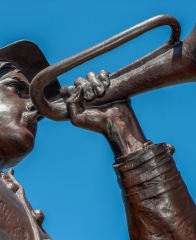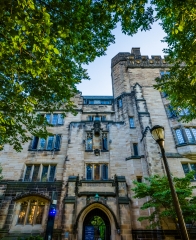 / Coming to Grips with Racism
Subscribe
/ Coming to Grips with Racism
Subscribe

Why is it so hard to talk about racism? Especially one’s own?
This is a question I receive and think about often, because I am an African American history professor who has spent 15 years teaching about and studying race in the history of the United States. As such, I subscribe to a specific definition of racism: racism = racial prejudice + institutional power.
Most people talking about racism are actually talking about racial prejudice -- the irrational suspicion, hatred or judgment of a group of people based on race. We are all capable of racial prejudice. I certainly possess racial prejudice, including toward African Americans. No one who has come of age in the United States is free of racial prejudice toward people of color. Our key institutions -- including schools, courts and law enforcement, laws and policies, news and entertainment media -- all promote the inferiority of people of color, especially African Americans. Think how psychically damaging this is to people of color. I cannot be racist, however, precisely because, as a black person I do not have institutional power. I am not a better person: I have less power.
To explain institutional power for students, I use the classroom as an example. I point out that, as the teacher, I should be the authority. For the most part, I am -- in that classroom. But say I give a white student a grade she dislikes. Once she takes her complaints outside my classroom, I am no longer the one "in power." Her institutional power as a young white student outweighs my individual power as the educated expert hired to teach her. All teachers are vulnerable to instances of disempowerment in this era of rampant helicopter parenting. Having one’s authority temporarily usurped, however, is profoundly different than having one’s authority denied.
Of course, there are individual whites without much power. As a collective, however, groups designated “white” have always been the dominant class in the United States. This is not because whites are naturally inclined to be powerful, or deserving of power, or likely to oppress others. They have been the dominant class because our nation operates through economic, political and social systems rooted in chattel slavery, the enslavement of people designated as black. It is illogical to think these systems would not have anti-black racism embedded in them.
Racism can be overt, taking the form of bigotry: Donald Trump, for example, describing Mexicans as rapists, drug dealers and criminals. More often, racism is a sneakier beast: light-colored pantyhose labeled “nude,” pinkish-beige band-aids are “flesh.” This systemic racism makes “white” the norm, and all else abnormal, inferior.
A more sinister example? Historically, sentencing laws have been much harsher for drugs that poorer people use -- for example, crack versus powder cocaine: same drug, different form. For many historical and societal reasons, blacks are disproportionately poor; therefore, they have suffered harsher sentencing, which has gravely affected the larger black community. Systemic racism is much more insidious, because it is woven throughout the core institutions structuring our society and therefore so much harder to identify and isolate for eradication.
African Americans have higher incarceration rates, higher unemployment, lower incomes, lower home and business ownership, less education, less healthcare, more disease, and lower life expectancy than whites. If you believe blacks are naturally dumb, sick, criminal, you have your answer for these discrepancies. If, however, you resist using stereotypes to make sense of your world, institutional racism provides a very practical (and very traceable) explanation for the inferior societal position of African Americans.
Here’s what many whites fail to understand. People of color find the fact that you are racist completely unremarkable. Of course you are! How could you not be? Being white in the United States and not being racist is like being an American and not using plastic: it’s possible, but it requires incredibly hard work and constant vigilance.
When asked, people of color are quick to assure white friends, family, colleagues, etc. that they are not racist. More often than not, we are lying. Why would we lie? Reasons include: 1) we have white people in our lives that we sincerely love or care about; 2) we have to get along with white people to make our lives easier, even safer; and 3) we do not want to upset white people who have direct power over us. You cannot underestimate how often people of color let racist things slide so as not to make you -- and therefore, us -- uncomfortable. Indeed, when whites are accused of racism, it rarely goes well. Whites only need say: “I don’t have a racist bone in my body,” or, “I’m sorry you interpreted it that way,” or, “You’re too sensitive,” and the discussion is over. People of color are not granted the authority or respect of recognizing their racist treatment -- which is very racist.
People often become angry when accused of racism because they mistake it for an accusation of bigotry, of being willfully hateful. To be racist is not to be a bigot, necessarily. A bigot has unreasonable beliefs about, but is also intolerant of other races. In other words: bigot = racial prejudice + racial hatred. All bigots are racist, but not all racists are bigots.
If we are serious about eradicating racism, we must let go of ego. We must accept what we learn, or admit what we already know about ourselves. We must not get mad. Or, when we do get mad, we must examine why. Whites must understand that, in the United States, because of a very particular history, they are born with the institutional power that turns racial prejudice into racism. No one is born with racial prejudice; we learn it, we can unlearn it. To unlearn it, however, requires deliberate work. And, while this work has no end, we should consider it necessary, because we all suffer for the divisions generated through racism.
Brenna Wynn Greer is a historian of race, gender, and culture in the twentieth-century United States. She works at the intersections of African-American, business, and visual culture history. Her current scholarship focuses on the relationship between African Americans' politics and their acts of making representations.
Photo Credit: Hikaru Hayashi, “Shadow,” via Flickr, 4 August 2005.








